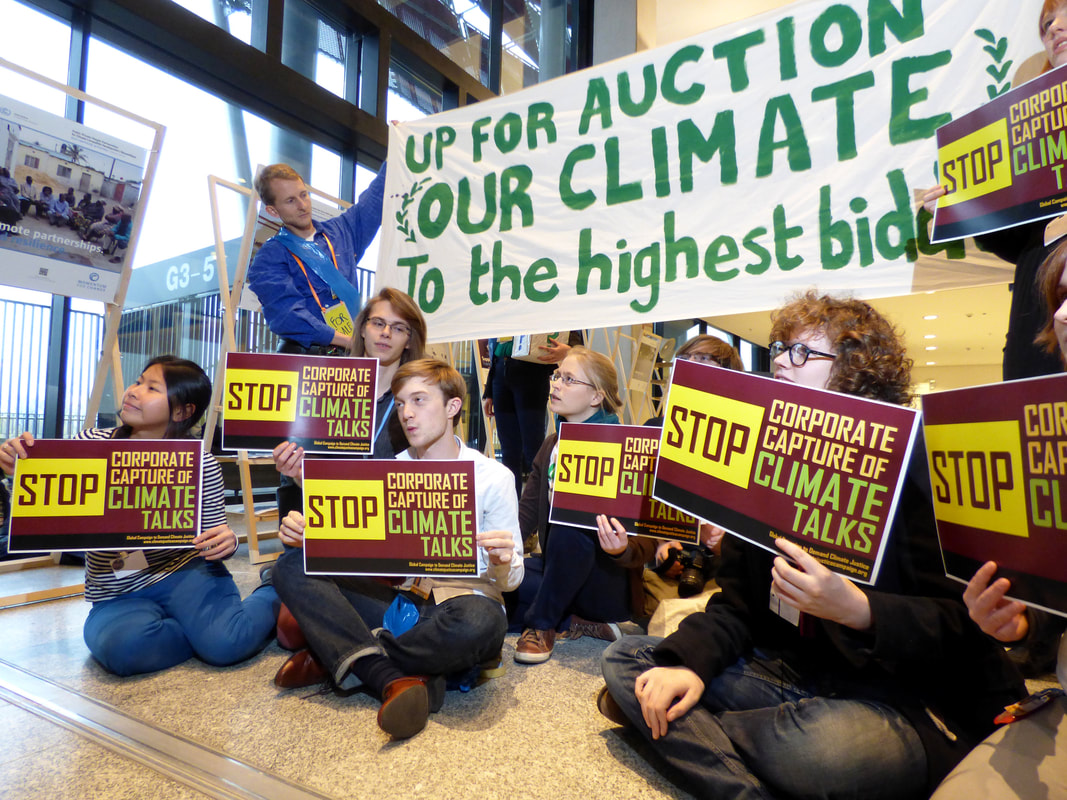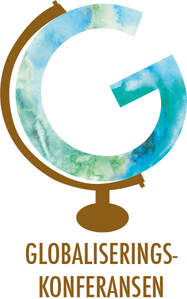|
This weekend at Globaliseringskonferansen Pascoe Sabido will talk about how corporations are taking control over European climate policy. Spire asked him some questions. Through hidden and open lobbying oil and coal companies, airliners, the car industry and other industries work to weaken EU climate policy, and promote false solutions. The lobbying leads to policies that exacerbate social injustice and accelerate environmental destruction across the world.
Spire will arrange a workshop on the influence of corporate lobbying on European climate policy. Pascoe Sabido, a researcher and activist in Corporate Europe Observatory (CEO), will lead the workshop at exposing corporate capture of EU environmental policy making and highlight and develop alternatives to the dominance of corporate power. We interviewed Pascoe Sabido about his work before the conference. - Who are you, and what do you do? I'm a Londoner living in Brussels and working for Corporate Europe Observatory as a researcher and campaigner, with a specific focus on climate, energy and the European Commission. - What is CEO? CEO is a small NGO set up more than 15 years ago to try and expose and roll back corporate influence over law-making in Brussels. We work in close alliance with public interest groups and social movements in and outside Europe to develop alternatives to the dominance of corporate power. CEO is registered as not-for-profit foundation. - Why and how is the corporate influence over policy making a problem? This corporate capture of EU decision-making leads to policies that exacerbate social injustice and accelerate environmental destruction across the world. Rolling back corporate power and exposing greenwash are crucial in order to truly address global problems including poverty, climate change, social injustice, hunger and environmental degradation. - How much power do the corporations have? Unfortunately since the 1970s and the event of neoliberalism, corporations have since had unprecedented increases to their power. This has seen wages in corporate boardrooms skyrocket while the average wage has stagnated. Equally, they have become an integral part of governing, avoiding regulations through ineffective voluntary schemes or weakening what regulations are in place. Globally, they have used Northern governments to push a free trade regime which enshrines their interests into law and allows them to maximise their profits while exploiting new global markets. The biggest corporations can now consider themselves far more powerful than countries - of the world's largest 100 economies in 2013, 40% are corporations. This is helped by a global move towards deregulation which has seen the state withdraw and corporations operate freely in many areas of great importance to health, the environment, poverty etc. Yet following the economic crisis of 2008, rather than accepting that deregulation and neoliberalism caused the crisis, we've seen corporate lobbying - in Europe at least - lead to a turbo-form of neoliberalism, with more privatisations and market liberalisations, handing over yet more power to big business and taking it out of the hands of so-called democratic governments. - How do you and your colleagues work? Through research - trying to find out exactly how corporations influence law making in the EU - and then campaigning to expose it. - What does a regular working day look like? Lots of meetings! We're a small organisation involved in lots of different coalitions and working with lots of social movements around the world, so Skype is invaluable. Research often involves submitting requests for EU documents (which they're obliged to hand over by law), as well as talking to friendly MEPs and their assistants for the latest information. We also give lobby tours around the European Quarter in Brussels, bringing the buildings to life through examples of different lobbying scandals and explaining how life inside the 'Brussels Bubble' works. - What is your motivation to spend your time to work on this issue? We're never going to create the bottom-up society we want if we don't challenge our main enemy and blocker: multinational corporations. They are the ones who are listened to by the government; they are the ones weakening the social, environmental and economic laws that we fight for. Without rolling back their power we won't get there. - Do you have any success stories or victories against corporate influence to share? Our focus is on the EU and its institutions as well as the UN, so some of the key victories have been in achieving better rules regulating lobbying, from stopping the revolving door between the public and the private sector to fighting for a lobbying register. But good rules are only effective if they are well implemented, and they are only well implemented if there's public pressure, so one of the key tasks is getting the information out there - to allies, to movements, to the media, to politicians. That's what we've been doing around the TTIP (transatlantic trade and investment partnership) and it's working. We're really building a movement against it and all sorts of groups are now getting involved in the fight. I think it's one we can win. - Have you got any enemies due to your activism? Lots! But many of them respect us for doing what we do well - making sure we research thoroughly and produce accurate work. We are well known in many parts of the European Commission and Parliament, as well as among many of the lobbying organisations we've targeted. I've even heard anecdotally that when a new report comes out, it's circulated around certain lobbying offices. - Are there any countries where the influence and power of corporate lobbying is worse or more common than others? Or the revolving door? The main lobbying hotspot in the world is Washington - Brussels comes second. But there it is far more transparent. They have a mandatory lobbying register while we have a voluntary one. However, both cities suffer from the serious problem that corporate lobbying has become a substitute for a healthy democracy, with those involved believing they represent a plurality of views, rather than the dollars or euros that are used to pay them. In both cities, citizen’s voices are marginalised. - Are there any policy areas where these issues are worse or more common than others? Trade is a clear one, where the power of corporate lobbies is very, very obvious (if you know where to look). Different departments within the European Commission (called DGs) have different attitudes towards engaging non-corporate stakeholders. Trade has always reached out to business - partly because trade was seen as a strictly economic activity, without realising or accepting the enormous impacts on society, the environment and economic actors who weren't big business. The Department responsible for tax has also been traditionally very close to corporate tax experts and the tax departments of big corporations, without accepting that these organisations had their own agenda to keep tax bills as low as possible. - How is the development regarding corporate influence on policy making? Is it getting better or worse? The new European Commission is unfortunately full of conflicts of interest, with many having close corporate ties. The new Commission includes an ex-petroleum company president as climate commissioner (Miguel Arias Cañete); an ex-corporate lobbyist in charge of financial services (Jonathan Hill); a former vice-president of the industry lobby group Le Cercle de l'Industrie in charge of economic policy (Pierre Moscovici); an ex-Goldman Sachs financier as research commissioner (Carlos Moedas); and the former political no.2 to a Czech multi-billionaire as consumer commissioner (Vera Jourova). - What are the outlooks? The next few years will be crucial - the economic crisis is far from over and the reasons that caused it in the first place have not been solved (due to successful lobbying by big banks), while the solutions to it are reinforcing the position of corporations in society. Equally, a global climate deal will be signed, which appears to be heading towards disaster as the interests of fossil rule companies are placed above people and the environment. And Europe and the US are trying to create a new transatlantic market which will also take power away from citizens and governments and put it straight into the hands of big business. So we're heading in a very definitive direction, but the question is how do we, as citizens, as social movements, react to it. It's up to us to stop it, to react, to reclaim the broken democracy we have now and turn it into something that is run by us all and for us all. But to do so the movement needs to be far greater and we need to reach far more people. Challenging lobbying will be part of it, but it's all about the bigger picture. - How can we as individuals, activists and organisations prevent and gain control over lobbyism? First step is awareness - from exposing what goes on both at national level and European level - and then it’s about undermining the legitimacy of corporations being in such influential positions. Strong rules are important, but they won't be enforced unless we change the public perception. So corporate lobbying has to be integrated into all campaigns and fights - against dirty energy, against big mines, logging, mega supermarkets, chemicals companies, big banks. It's one of the key ways they get their strength and we need to undermine it. We're calling on governments to end their cosy relationship with big polluters both at national level and in the UN climate talks, as happened to the tobacco industry by the World Health Organisation. It can be done if we all get behind it. Welcome to Spire’s workshop with Pascoe Sabido at Globaliseringskonferansen! Read more about The Corporate Europe Observatory The new European Commission Comments are closed.
|
|
Adresse: Schweigaards gate 34C, 0191 Oslo
Org.nr: 912 159 167 |
Vipps: #11378 |
Proudly powered by Weebly






